

At first glance, the English language capitalization rules might seem simple enough, but as you take a deeper dive into studying English grammar you will realize it gets a little more complicated. Most people know that the first word of every sentence and all proper nouns should be capitalized. However, many people don’t know that sometimes the first word of a quotation and the word after a colon also needs to be capitalized.
Then there are exceptions to every rule. People even get confused about identifying a proper noun in a sentence. The capitalization rules for the English language are particularly tricky in academic writing. This article discusses some of the basic capitalization rules that will help you be decisive and confident with English grammar every time.
Watch this lesson
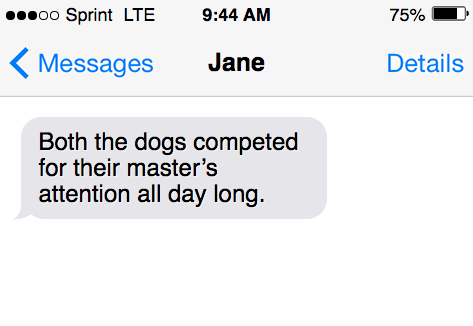
A proper noun is the particular name of a person, object, place, place, or organization. A proper noun is used in a sentence to make the noun more specific and identifiable, for instance Paris, Monday, Marilyn, etc. All adjectives that have evolved from proper nouns should also be capitalized, even when they are in the middle of a sentence.
a. I bought the new Apple iPhone from Amazon, last week.
b. Julius Cesare began autocratic rule in Rome which eventually led to his downfall.
c. They decided to name their firstborn child Elvis after the late King of Pop.
The names of towns, cities, villages, countries, religions, companies, institutions and political parties should all be capitalized as they are all proper nouns.

a. Universal Studios Singapore simply known as Universal Studios is located on Sentosa Island in Singapore.
b. We saw some of the most spectacular views from Harder Klum looking over the town of Interlaken in Switzerland.
c. Oxford University has a rich history that goes back many centuries.
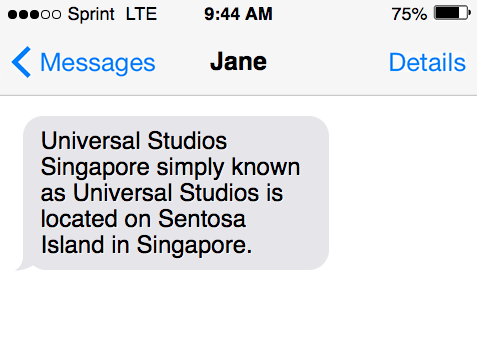
Common noun usually refers to a type of thing, place, or person or it represents a concept. Generally, common nouns are not capitalized in the middle of a sentence. However, when they are used to address someone, in particular, they can be capitalized—for example, grandpa, grandmother, dad, and mom.
a. I have been calling Mom all day, and she hasn’t answered once.
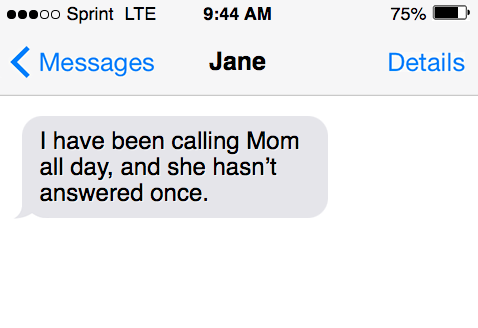
Only proper adjectives follow the rule of capitalization in the English language. Proper adjectives are formed only when they are used to describe a proper noun. Some categories of proper adjectives are as follows:
a. The Buddhist practice of meditating for inner peace is getting popular worldwide.
b. The locals always proclaim that Maldivian sharks are very friendly and never attack anyone.
c. The atmosphere of the government office is almost Kafkaesque.

Most pronouns need to be capitalized only when they are placed at the beginning of a sentence. Only the pronoun ‘I’ needs to be in capital letters regardless of its placement within the sentence.
a. It’s been too long since I visited my hometown.
b. Silver and I are going to the library after my shift ends here.
c. She said I can call her tomorrow to get the notes from her.
d. I loved taking the Seine River cruise at midnight.
Most of the words in any creative title are capitalized. All the major words present in the title of films, poems, short stories, and novels are generally capitalized. The verbs, Nouns, proper nouns, and adjective starts with a capital letter. Also, as a general rule conjunctions, prepositions, and articles are not capitalized.
The rules differ according to the different style guides used to spell the particular title. Many fiction writers and poets don’t adhere to such strict rules of grammar. There are many titles of great creative works that do not follow any rule of capitalization or style guides.
For instance, APA style follows two types of capitalization rules, one is the Title case, and the other is the sentence case. In the former scenario, APA Style makes all major words capitalized and requires the minor words to be in lowercase. In the latter type of APA style, all the words are only in lowercase, and nothing is capitalized.
According to APA style guide, and word that is made up of three words or less is considered to be a minor word.
a. Manu Star Wars fans were disappointed with Star Wars: The Last Jedi and found it to be anticlimactic.
b. Louisa May Alcott wrote the Novel Little Women that was published in 1868.
c. The Secret Life of Walter Mitty is a movie about a daydreamer that escapes his mundane life by living in a world of fantasy.
d. The poem by E.E Cummings, [i carry your heart with me(I carry it in] is quoted by lovers all over the world, even today.
If a complete sentence is being quoted as part of the larger sentence, then the first word of the quote should be capitalized. If the quoted part is just a phrase, then the starting word of the quote does not need to be capitalized.
Capitalized: The teacher said, “Principal will be here shortly.”
Not Capitalized: the teacher informed us the principal would ‘be here shortly.”
a. Last time Ted called me, he said, “I will send you a Christmas gift.”
b. None of his “childhood friends” supported him when they divorced.
c. Oscar Wilde once said that gods only answer our prayers “when they want to punish us.”
All proper nouns that are names of people should always be capitalized. The first letter of the first, middle, and last names is always a capital letter. It is also a capitalization rule that the suffixes and people’s titles also need to be capitalized.
For example, Bloody Marry, Alexander the Great, Sir Isaac Newton, Ivan the Terrible, etc.
When titles like Ms, Mr, Mrs, and Dr are considered part of particular names, they are also capitalized. This capitalization rule is primarily followed when you address someone by their position as if it’s a part of their name.
Capitalized: I have worked many years under the Chief Secretary Zoey Smith
Not Capitalized: Zoey Smith was one of the best chief secretaries the company ever had.
i. Only capitalize titles and occupations when they are used as part of names.
Capitalize: Mr. Bob Roy is the Chief Editor of Chronicles for the past four years.
Not Capitalize: The chief editor of Chronicles will soon retire.
ii. The title is capitalized it is used non descriptively
a. Dr. Smith, who will preside over the meeting, is running a little late.
iii. When the article ‘the’ is placed before a position or job title do not capitalize it.
a. Smith, the president will be here soon.
b. The president, Dr Smith, will join us this afternoon.
c. Archie was the editor of the magazine.
iv. The titles in signature lines should be capitalized. Although this is not a strict rule, most style guides recommend capitalizing the title when they come after the signature line or name in the address.
a. John Doe, General Manager
b. Mike Smith, Chief Editor
c. Shelly Brown, CEO
d. Lily Singh, Creative Head
An acronym is a type of abbreviation that is made from the starting letters of other words that are pronounced together as a single word. All the letters in an acronym are capitalized.
a. ASAP – As soon as possible
b. FOMO- Fear of missing out
c. PIN- Personal Identification Number
d. SCUBA- Self-contained underwater breathing apparatus
An initialism is very similar to an acronym, but for initialism, every letter in the word is pronounced as is.
a. RIP – Rest in peace
b. USA- United States of America
c. FBI- Federal Bureau of Investigation
d. TMI- Too much information
Initials are capital letters that start each word of a given name. For instance, if someone’s name is Peter Parker, their initials will be PP. All letters of the initials are always capitalized.
a. MJ- Michael Jackson
b. MLK – Martin Luther King
c. JFK- John Fitzgerald Kennedy
d. JRR Tolkien – John Ronald Reuel Tolkien
The name of different days, months, and holidays are different proper nouns. This is why when you look at any calendar, all these names are in capital letters.
Even when the name of days and months are abbreviated, they should always be capitalized. For instance, Mar, Feb, Aug, Sept, Dec, etc, are also capitalized.
Additionally, the most popular holidays you will find marked in a calendar are always capitalized.
j. Fourth of July
Most style guides suggest that letters addressing someone should always be close with a valediction. The exact phrase used for valediction depends on the receiver of the letter and their relationship with the sender. Valediction is an address or statement that is used as a farewell.
The first word of these complimentary closes or farewell words is always capitalized.
a. Yours sincerely,
b. Wishing you good health
Oliver Smith, Vice President
As is explained above, there are particular instances where the rule of capitalization is applied. The primary rule of capitalization in the English language is that the first letter of the first word of a new sentence should be in capital letters.
Also, another rudimentary rule is that all proper nouns are always capitalized. There are many other instances where letters get capitalized in the English language.
For example, the initials formed by abbreviating the name of a person is always in capital letter, the movie titles are also generally capitalized.
Significant historical eras also need to be capitalized whenever mentioned anywhere. Even the prehistoric eras are capitalized in all history books—for instance, Bronze Age, Stone Age, Dark Ages, Middle Ages, and Renaissance.
APA rules are the official style of the American Psychological Association and are most commonly used to present sources in social sciences, education, and psychology. The APA style guide is used as a reference to write most of the academic research papers in their respective fields.
APA style guide has two basic types of capitalization of titles, sentence case and title case. In sentence case, all major words and minor words are in lowercase. While in the title case only the first letter of the major words is capitalized while the first letter of the minor word is not.
According to APA style guides, major words are generally four words or more. They consist of verbs, linking verbs, nouns, adverbs, adjectives, and pronouns. The minor words are the shorter words that are generally made of three words or less. Mostly articles, short prepositions, and conjunctions form minor words.
The MLA style guides have specific rules for citing sources or research and formatting manuscripts. It provides writers and research scholars with a way of citing their sources through parenthetical citations in their works.
The capitalization rules from MLA style guides are used to give authors a consistent way of formatting the title while remaining true to the intrinsic style of different languages. According to the MLA rules, English language titles are in title case, while the title in any other language is mainly in lowercase. Some scholars find this strict distinction a little arbitrary but the MLA guide claims it to be in accordance with style guides of different languages. These distinctions are followed as a way of convention, respecting how different languages have evolved.
In the French language, all nouns are not capitalized, while all nouns in the German language are capitalized. The same distinction remains in the titles of French and German texts.
The Chicago Manual of Style has been in publication since 1906. The manual is commonly known as CMOS, CMS, or Chicago Style. It is a style guide primarily used for American English that is widely circulated and trusted. The capitalization rules in CMS are quite similar to the rules in MLA and APA style guides, with a few exceptions.
The Chicago style is most commonly used in conventional journalism.
The capitalization rules of the Chicago Manual of Style are as follows:
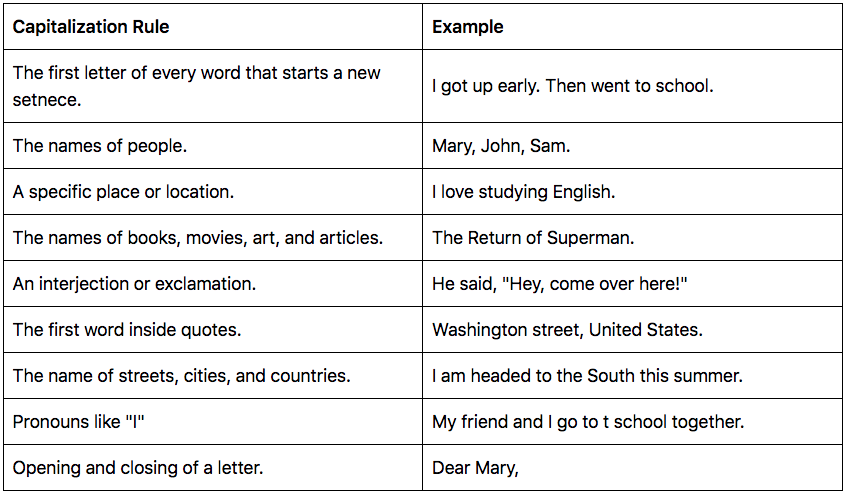
As there are instances where words should be capitalized, as a rule, there are also particular instances where letters should never be capitalized. Listed below are some basic rules where capitalization is not required.
Many people get confused when they are instructed not to capitalize the name of seasons but capitalize the name of days, months, and years. Unless the name of seasons is part of a tile or pronoun, they are not capitalized.
a. When I was younger, winter was my favorite season
b. I eagerly wait for the summer holidays to start.
c. If you have read Ruskin Bond, you will know he was in love with the monsoon season.
However, when the exact name of seasons appears in titles or as part of the proper noun, they are capitalized.
a. The film 500 Days of Summer (2009)
b. Summer Smith, Chief Editor
A common noun refers to a non-specific or general category that names any place, object, person, or idea. As they are not naming a particular object or person, they can refer to a broader range of things. Some instances of common nouns are closet, mall, school, road, bedroom, child, ship, woman, spoon, boat, etc.
a. The ambulance was called immediately.
b. Haley is researching the best school to enroll her child.
c. The bus never stops her, you need to walk this path a little further.
d. For his seventeenth birthday, he was gifted a Honda sedan car.
The only time when a common noun is capitalized in the middle of a sentence is when it is used to address a certain individual. Mom, which is a common noun will be capitalized in a sentence, only when it is used to address a particular individual.
When directions are used to point someone in the right way then they are not capitalized. As long as you are not talking about a specific place and just helping someone locate a place, or find their way, the name of directions is not capitalized.
a. Continue until you come across the lighthouse.
b. The factory is a few miles east of the public library.
When direction words are used not to specify a place but only to better describe the region they are not capitalized.
a. I loved exploring eastern Europe with my friends.
b. It’s much hotter near the western border.
The name of any academic subject like geography, chemistry, electrical engineering, maths, or any other general subject does not require to be capitalized.
a. I loved studying biology but hated math classes.
b. When I was younger, I was keenly interested in history.
The only exception to this rule is when the subject is the name of a specific class, like Advanced Algebra, Renaissance Literature, History 3.0, etc.
Most people mistakenly capitalize the word ‘birthday’ when they wish someone on their birthday. As long as you are not writing all letters in capitals, the first letter of special occasions doesn’t need to be capitalized. Anniversary and birthday wishes are all in lowercase.
a. I hope all your wishes come true on this birthday.
b. I wish you a very happy anniversary and hope you enjoy your special day with your partner.
There are many punctuation marks after which capitalizing a word would be grammatically incorrect, except for a proper noun. Generally, a colon is followed by a list. As long as the list does not consist of proper nouns or complete sentences, they need not be capitalized.
a. Following is the list of things you see in a garden: flowers, trees, insects, etc.
The semicolon is mainly used in place of a coordinating conjunction or a comma to connect two related but independent clauses. A semicolon works best when the relationship between the two distinctive clauses in the sentence is clear.
a. I have early classes tomorrow; I cannot come to the party tonight.
b. Think about it for now; you can inform me tomorrow.
Similar to the semicolon, when a comma is used, the sentence does not end there. That is why anything following the comma is not capitalized.
a. The match was over, but the fans refused to leave.
b. If you are late again, bring a note.
c. No, she will not come out today.
Anyone that knows these basic rules of capitalization in the English language will confidently know what is grammatically correct and incorrect. Just a little practice revising and memorizing these clauses will make anyone a pro in the capitalization rules.
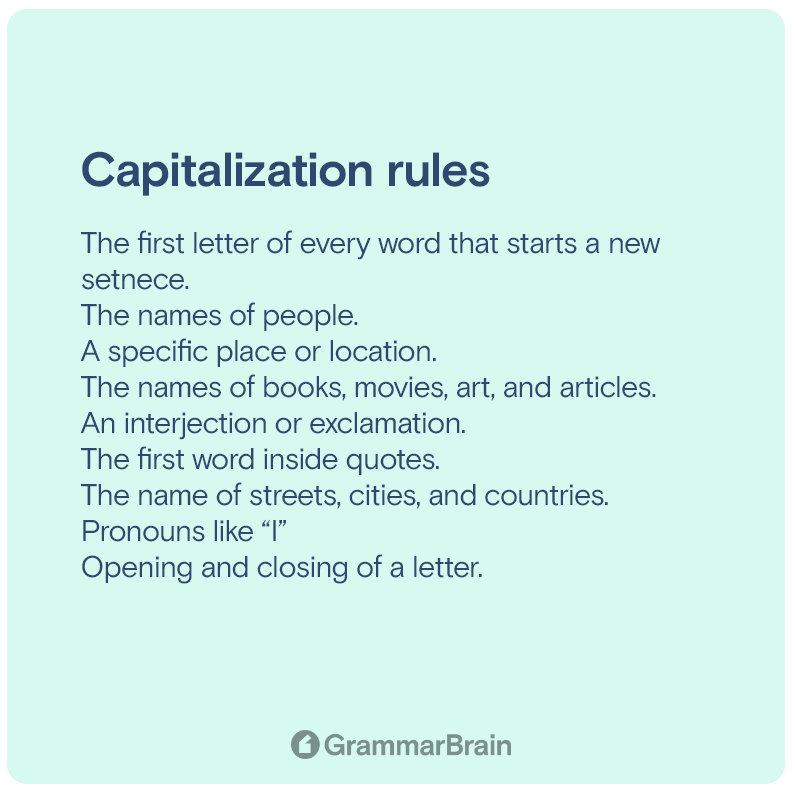
Inside this article

Fact checked:
Content is rigorously reviewed by a team of qualified and experienced fact checkers. Fact checkers review articles for factual accuracy, relevance, and timeliness. Learn more.

About the author
Dalia Y.: Dalia is an English Major and linguistics expert with an additional degree in Psychology. Dalia has featured articles on Forbes, Inc, Fast Company, Grammarly, and many more. She covers English, ESL, and all things grammar on GrammarBrain.